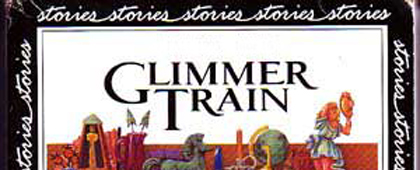
i know it is called glimmer train. i picked one up in a barnes and noble once. i never read a story in it except for if it was republished in an anthology maybe. i submitted to glimmer train once i think a long time ago. i never got interested in glimmer train for some reason.
– Darby Larson
READ MORE >
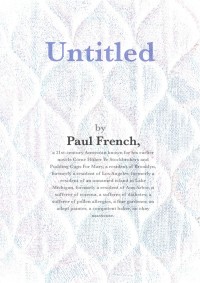 Untitled
Untitled
by Paul French
Beggar Press, 2011
784 pages / $19.95 Buy from Beggar Press
Rating: 0.0
Paul French’s Untitled (2011) is either his most brilliant or most obnoxious novel yet—probably, it seems, his most obnoxious. What’s brilliant about French’s novel is this: for Untitled French has invented, not just fictional characters (as you might get in a realist novel), not even just a fictional world (as you might get in a sci-fi novel), not even just a fictional universe (as you might get in a fantasy novel)—Untitled isn’t set in our universe, it isn’t even set in our dimension. For the novel French has invented fictional systems of mathematics, of physics; electromagnetism, nuclear forces, gravity, French has done away with them altogether. French’s characters aren’t made of cells, and within those cells atoms, and within those atoms protons and neutrons, and within those protons and neutrons quarks. French’s characters aren’t even length/width/height-type characters: whatever dimension Untitled is set in, it’s not the traditional dimension in which one would set a novel (the third). READ MORE >
53 Comments
August 3rd, 2011 / 12:05 pm

Jono Tosch is a poet and artist who blogs at Oil Changes, a rolling document that knocks you over the head with its absurdist, agricultural, and poetic thought. Jono bangs a drum similar to what I imagine Thoreau would kick and scream like today were he to be wormholed from the past and into our era. And like Thoreau, Jono is a self reliant, rare to ask a hand for help unless it was of a total necessity.
But now, Jono is asking for help, help to fund a month of “agricultural research” on the famed garlic farm of Stanley Crawford, author of Log of the S.S. Unguentine. By helping him make his way from Massachusetts to New Mexico, Jono promises to trade ” top-notch road and farm content if you pony up some gas $$$.”
READ MORE >
Author News / 1 Comment
August 2nd, 2011 / 5:28 pm
Some of these pictures are honest glimpses at moments I’ve had or places I’ve been, while others are staged for their drama or to convey a certain mood, and most are taken with my cell phone camera (a.k.a. faketography). This week: Play possum, always look on the bright side, watch your step, and don’t get captured. – TD
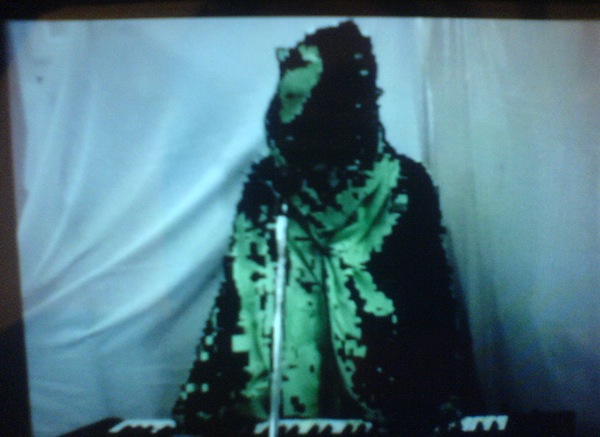
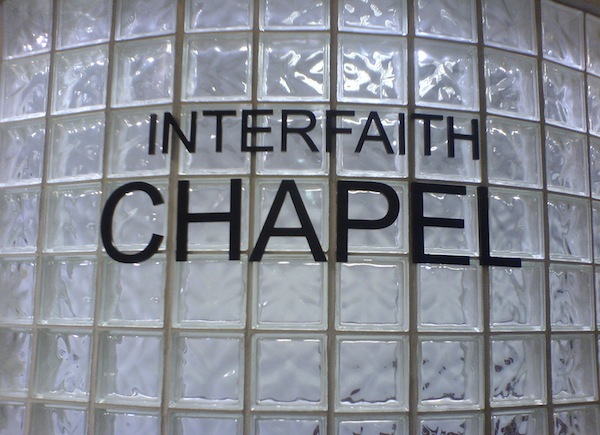 READ MORE >
READ MORE >
Film / 2 Comments
August 2nd, 2011 / 5:13 pm
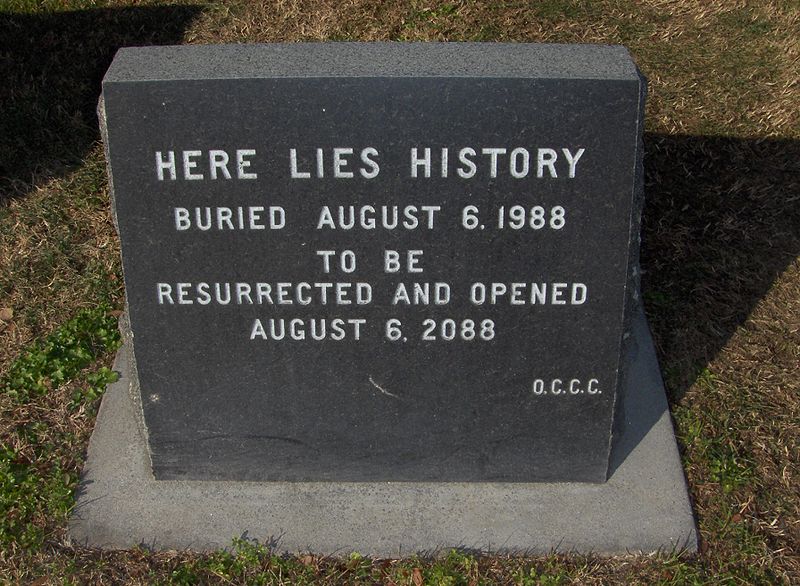
I’ve been going through my older writing I never did anything with to see if I can send any of it out. In 2000 and 2001, I wrote my master’s thesis, a short story collection called How Small The World. I wrote a bunch of other, mostly insane stories about, well, most of the themes I’m still writing about. I was 26. I was writing literary fiction for the first time after writing genre fiction, erotica, for years, so I was trying to learn the rules as I wrote and also trying to be less filthy. I only sometimes succeeded on that front. Some of the stories hold up in that I’m not totally humiliated. Don’t get me wrong. There is embarrassment but I’ll survive. The stories are certainly workshoppy at times, a bit ponderous, slow moving, introspective, and far more sedate than what I’m currently writing but they’re also publishable with work. This is how I spent my summer vacation–identifying the strange preoccupations I had ten years ago and pretending I don’t have a whole new set of preoccupations now.
READ MORE >
Craft Notes / 31 Comments
August 2nd, 2011 / 4:34 pm
Does anyone write disses like this anymore?
The literary convention of the time is so artificial… that, naturally, the feeble are tempted to outrage, and the strong are led to destroy the very foundations and rules of literary society. Signs of this are everywhere apparent. Grammar is violated; syntax disintegrated; as a boy staying with an aunt for the week-end rolls in the geranium bed out of sheer desperation as the solemnities of the sabbath wear on. The more adult writer do not, of course, indulge in such wanton exhibitions of spleen. Their sincerity is desperate, and their courage tremendous; it is only that they do not know which to use, a fork or their fingers. Thus, if you read Mr. Joyce and Mr. Eliot you will be struck by the indecency of the one, and the obscurity of the other. Mr. Joyce’s indecency in Ulysses seems to me the conscious and calculated indecency of a desperate man who feels that in order to breathe he must break the windows. At moments, when the window is broken, he is magnificent. But what a waste of energy! And, after all, how dull indecency is, when it is not the overflowing of a superabundant energy or savagery, but the determined and public-spirited act of a man who needs fresh air! Again, with the obscurity of Mr. Eliot. I think that Mr. Eliot has written some of the loveliest single lines in modern poetry. But how intolerant he is of the old usages and politeness of society – respect for the weak, consideration for the dull! As I sun myself upon the intense and ravishing beauty of one of his lines, and reflect that I must make a dizzy and dangerous leap to the next, and so on from line to line, like an acrobat flying precariously from bar to bar, I cry out, I confess, for the old decorums, and envy the indolence of my ancestors who, instead of spinning madly through mid-air, dreamt quietly in the shade with a book. -Virginia Woolf, “Mr. Bennett and Mrs. Brown”
Power Quote / 29 Comments
August 2nd, 2011 / 1:59 pm
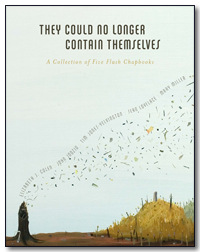 They Could No Longer Contain Themselves:
They Could No Longer Contain Themselves:
A Collection of Five Flash Chapbooks
by Elizabeth J. Colen, John Jodzio,
Tim Jones-Yelvington, Sean Lovelace, and Mary Miller
Rose Metal Press, 2011
248 pages / $15.95 Buy from Rose Metal Press
Rating: 7.0
The problem with collections of flash fiction is their unevenness, or that the reader recognizes the unevenness more than in, say, a novel. Maybe this also applies to story collections, especially non-linked stories, though there are a few that come away feeling complete–to me, usually collections with fewer stories. I can’t think of a single flash collection that does not seem hill-and-valley. They Could No Longer Contain Themselves is no exception. I find it interesting to note, however, that the chapbooks that were linked helped me see past the valleys, as I was always aware of the range. Okay, enough of this terrible analogy. On to the individual chapbooks. READ MORE >
59 Comments
August 2nd, 2011 / 12:02 pm
I was at the Brooklyn Library (central branch) earlier, when walking through the fiction section, I saw Vollmann’s books. I picked up You Bright and Risen Angels, opened it up, and found the following inscription. Unfamiliar with Vollmann’s signature, I looked it up just now using Google images. It’s a match. Pretty sure it’s real. You’d have to be a pretty huge Vollmann fan to know the man’s signature offhand, and then if you were that kind of fan it’s doubtful this would be the inscription used.
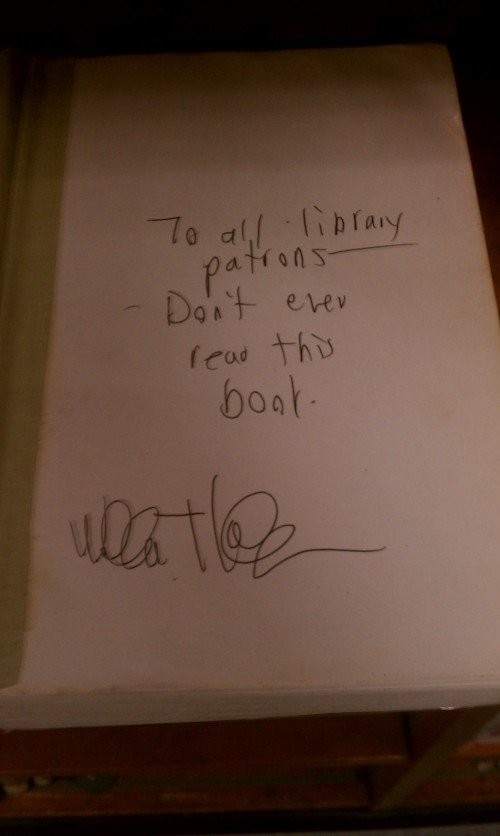
Random / 9 Comments
August 2nd, 2011 / 9:52 am
1. The IRS is accusing NANO fiction of being pornography (sort of a new take on the term flash).
5. This is the best fish/beer/existential ramblings blog I believe you will find. You’re welcome.
I’m probably going to people the world with robot birds.
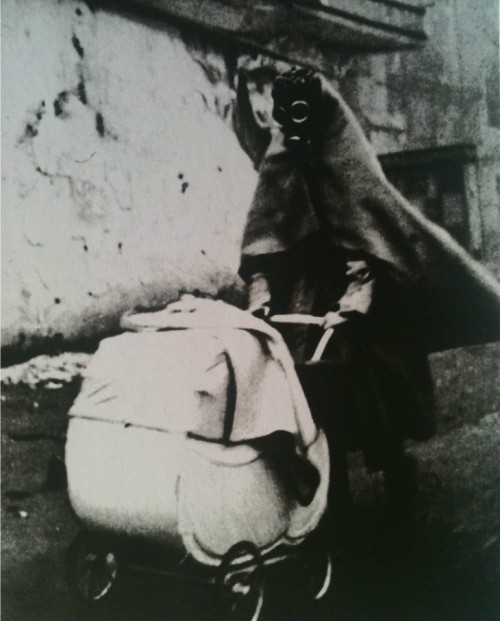
4. Patrick Somerville & Lindsay Hunter converse with one another over at Hobart.
First thing: I am suspicious of all writers and human beings who are not sick of themselves.
33. Roy Kesey interview at Bookslut.
It would be great if having climbed a given mountain meant that climbing some other similar-shaped mountain would be easier, but I don’t think that’s quite the way it works — at least not for me.
4. Everyone needs discussions/lessons on plot. Here are some, couched in a review of Tana French at The Millions.
Lesson: What Gary Lutzcalls “page-hugging” prose isn’t necessarily anathema to plot.
yo, veridical dat.
Random / 1 Comment
August 2nd, 2011 / 9:35 am









